A WordPress developer is an experienced programmer, whose work is concentrated on manipulating the WordPress platform to craft websites. Similarly, a web developer is a skilled programmer who can develop websites of different kinds using a variety of web frameworks and technologies.
Both WordPress Developers and Web Developers are skilled programmers who write code to build websites. Web Developer is a broad term that covers anyone who codes websites regardless of the used tools or techniques. While WordPress Developer is a Web Developer who is specialized in creating websites using the WordPress platform.
Similarly, Front-end Developer, PHP Developer, and Full-stack Developer are other closely related titles whose jobs include specific tasks in the web development industry.
That said, what is the difference between all mentioned titles, and how do their responsibilities differ from the tasks of a regular WordPress developer? This is what we are discussing in this article.
1. What Is a WordPress Developer?
Although WordPress is an open-source platform, its source code is not designed to be modified by anyone, regardless of his/her coding skills and proficiency in web development.
The right way to modify the original WordPress behavior would be to use a third-party plugin or theme, or sometimes to build custom ones.
In general, the required skills to install free (or paid) plugins and/or themes are quite easy and straightforward. They are normally part of the needed skills to run the platform itself. Nonetheless, developing custom-built add-ons requires many different skills.
A WordPress developer is a skilled PHP developer who possesses the required knowledge to understand WordPress core architecture, create a WordPress site, as well as develop custom-built plugins and themes for WordPress.
To do so, WordPress developers should have a strong understanding of the core structure and functionalities of WordPress. In addition to a decent share of knowledge about how web content management systems work.
2. WordPress Developer Responsibilities
Despite the regular job of WordPress developers mostly revolving around developing plugins and themes, some companies seek other specific requirements.
An average WordPress developer should be able to do ALL of the following on a WordPress site:
- Design, implement, and manage WordPress websites.
- Install WordPress and create the website structure.
- Design and implement new features for WordPress, or modify the existing ones.
- Develop plugins and themes and make sure they are working properly in all environments.
- Optimize developed modules and avoid conflicts between them.
- Control both front-end (responsive design, interactivity, …) and back-end (databases, APIs, …) aspects of the website.
- Manage all technical aspects of the content management system.
- Monitor the website performance, keep it updated, and troubleshoot any issues.
3. Are WordPress Developers Real Developers?!
The web community uses “WordPress Developer” to refer to various jobs dealing with the WordPress platform. In many cases, the indicated job tasks don’t necessarily reflect the actual expertise behind this title. This raises a debate about whether WordPress developers are “real developers” or not!
WordPress developers are definitely REAL developers whose duties involve both front-end and back-end development of a WordPress website. Basically using a set of programming languages and techniques.
WordPress developers have a wide umbrella of responsibilities, most of them do include the development and implementation of “partial” website solutions.
As their focus is on WordPress websites, WordPress developers should be able to understand the platform’s structure and its core functions and libraries. This necessarily requires certain levels of experience in PHP, MySQL, CSS, and other languages that were originally used to build the platform.
For more details, we recommend referring to our detailed guide about programming languages required to start coding in WordPress.

Must Know Languages To Code In WordPress
Learning how to code in WordPress requires basic (and sometimes advanced) knowledge of the main techniques that were used to build the platform.
In the following table, we summarize the essential programming techniques that WordPress developers should learn to succeed in their careers.
| Programming Language / Technique | Description |
|---|---|
 PHP | The programming language of WordPress: The entire WordPress platform is written in PHP. Its core system as well as all themes and plugins are based on PHP. |
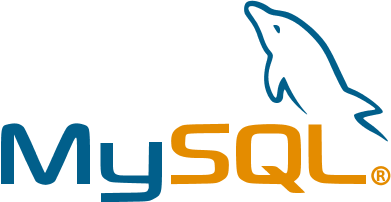 SQL | The standard query language: using SQL, you will be able to execute queries on the database, retrieve data from tables, insert new records and update existing ones. |
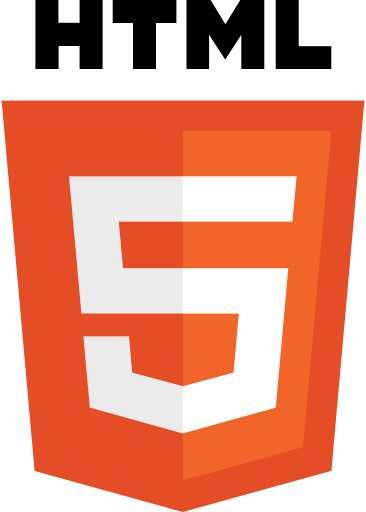 HTML | Building the page structure: WordPress utilizes HTML to build the structure of its pages, posts, and templates. |
CSS | Styling your site: WordPress relies heavily on CSS. Almost every HTML element has specific CSS rules that define the visual appearance and formatting of this element. |
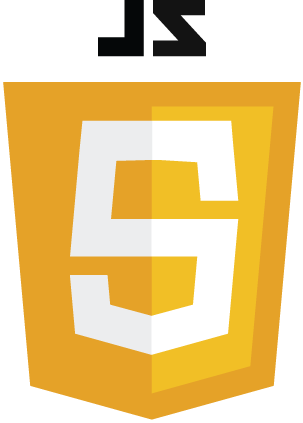 JavaScript | Making your site interactive: WordPress utilizes JavaScript to add dynamic behavior to pages and posts, basically to include interactive features like sliders and timers. |
jQuery | Writing less JavaScript: jQuery is a feature-rich JavaScript library. It makes HTML document traversal and manipulation much simpler with APIs that work across browsers. |
4. WordPress Developer vs Web Developer
Besides WordPress developers, web developers are also able to develop websites of different kinds. In the first place, both WordPress developers and web developers are skilled programmers who write code to build websites and put them online.
Web developer is a broad term for anyone who codes websites no matter what tools or techniques he/she used to create the website. While the WordPress developer is the one who is usually specialized in building websites using the WordPress platform.
Accordingly, is WordPress Developer a web developer? certainly Yes!
WordPress Developer is a web developer whose work is concentrated on implementing and manipulating the WordPress platform to craft websites.
In the following table, we break down the key differences and similarities between web developers and WordPress developers.
| Criteria | WordPress Developer | Web Developer |
|---|---|---|
| Job | Develop and maintain small to medium websites based on WordPress | Develop and maintain small to advanced and highly customized websites and web applications using different CMS platforms and web development frameworks |
| Solutions | WordPress-based websites | Websites & web applications |
| Website Complexity Level | Low (up to Medium) | High |
| Frameworks & Tools | WordPress | Angular, Express, React, Vue, Node, Flask, Django, Zend, Laravel, Spring, Ruby on Rails, … |
| Client-side Development Aspects | Clean web-pages, responsive design, bootstrap, UI & UX design, … | Interactive user-friendly interfaces, easy-to-use functionalities, dynamic visual elements, responsive design, bootstrap, UI & UX design, … |
| Server-side Development Aspects | Secure plugins and themes, WordPress core functions, custom post types, … | Software design and MVC (model-view-controller), object oriented programming, transactions, security and scalability, … |
| Front-end Programming Languages/Techniques | HTML, CSS, JavaScript, jQuery, … | HTML, CSS, JavaScript, jQuery, … |
| Back-end Programming Languages/Techniques | PHP | PHP, Java, C#, Python, JavaScript, Ruby, … |
| Databases | MySQL, MariaDB | Relational databases (Oracle, MySQL, PostgreSQL, MariaDB) and non-relational databases (MongoDB) |
| Database Query Language | SQL (Structured Query Language) | SQL (Structured Query Language), NoSQL (Not Only Structured Query Language) |
| APIs | REST | REST, SOAP |
Moreover, there are many other job titles whose skills might overlap with a WordPress developer. To understand the difference, it will be useful to clarify the different levels of developers and the position of WordPress developers.
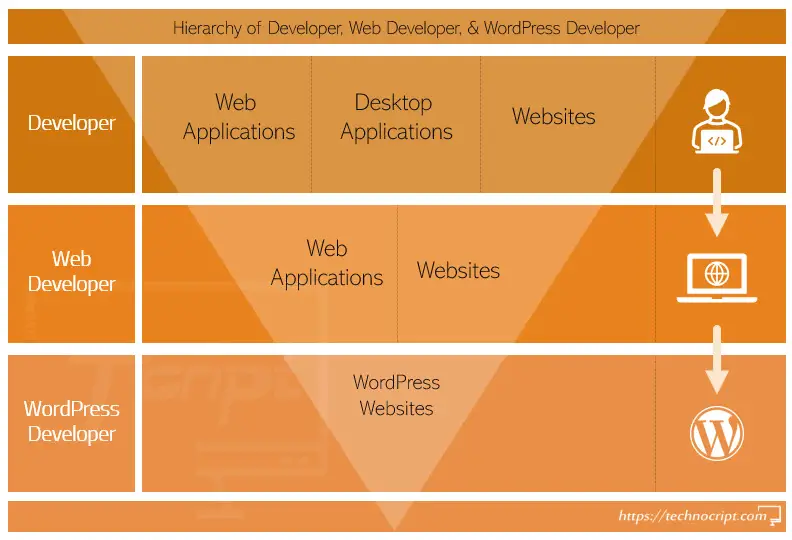
5. WordPress Developer vs Front-end Developer
Front-end development is the part of website building related to developing interactive user interfaces. It uses basic technologies to implement web pages that present the website content and web forms that send data to the web server.
The primary tasks in front-end development have many intersections with the tasks of WordPress developers. That being the case, what is the difference between WordPress Developer and Front-end Developer?
WordPress developer is not necessarily a front-end developer and doesn’t usually need to learn advanced front-end technologies such as
AngularandReact. Yet, the regular activities of WordPress developers do include many front-end tasks using basic technologies such asHTML,JavaScript, andCSS.
WordPress developers focus on building plugins and themes to extend the basic functionalities of WordPress. This generally requires working on both front and back-end aspects to have these features implemented.
6. WordPress Developer vs PHP Developer
PHP is open-source programming and scripting language that creates dynamic interactive websites and web applications. It was created in 1994 as a language for web development.
The entire WordPress core system as well as all themes and plugins are written in PHP. This would certainly require any WordPress developer to have a minimum level of proficiency in PHP to extend WordPress’s functionalities.
PHP is a programming language for back-end development!
WordPress is a content management system built in PHP!
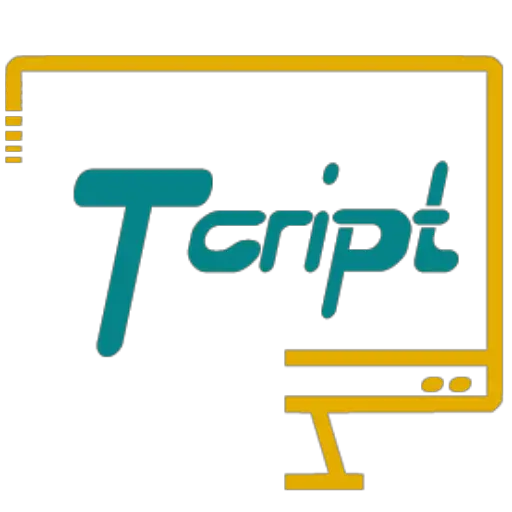
Therefore, what is the relationship between WordPress Developer and PHP Developer?
Any WordPress developer is inherently a PHP developer, but not every PHP developer is necessarly a WordPress developer. However, PHP developers can easily learn WordPress and become WordPress developers.
The regular task for PHP developers includes writing server-side scripts in PHP, connecting them to the database, and integrating them with front-end interfaces. This is ultimately similar to some of what WordPress developers do when building plugins and themes.
7. WordPress Developer vs Full Stack Developer
In relation to front-end development, a Full-stack Developer is a web developer who works on both the front and back-end sides of the website at the same time.
The regular job of full-stack developers covers processing data on client and server sides, integrating user interfaces with their corresponding back-end logic, configuring the server environment, deploying the business logic, as well as ensuring the security, scalability, and other performance aspects.
Comparably, WordPress developers create WordPress websites by designing the front-end and back-end aspects of the developed feature. They are also responsible for the website’s security and performance.
Considering this comparison, it’s quite obvious that both titles have many tasks in common. Thus, what is the difference between Full-Stack and WordPress Developers?
Both WordPress developers and full-stack developers work on the two sides of the website. However, WordPress developers usually perform a quite smaller subset of what expert full-stack web developers do.
Accordingly, WordPress developers are not exactly full-stack developers. Their job focuses on one particular environment instead of covering a wide range of web development frameworks and techniques.
8. WordPress Developer vs Web Developer (Salary)
To get an overall overview of the salaries of WordPress and web developers, we depend on glassdoor as a trusted and well-known source of this sort of information.
We show in the following table the average annual salaries of WordPress developers, web developers, and other close job titles in multiple countries. Including the United States, the United Kingdom, Australia, and Canada. Each is in its local currency.
| Job Title | United States ($/year) | United Kingdom (£/year) | Australia (A$/year) | Canada (CA$/year) |
|---|---|---|---|---|
| WordPress Developer | 71K | 40K | 71K | 64K |
| Web Developer | 97K | 35K | 83K | 64K |
| Front-end Developer | 101K | 45K | 105K | 73K |
| PHP Developer | 107K | 40K | 104K | 65K |
| Full Stack Developer | 113K | 50K | 106K | 78K |
It’s worth noting that the accuracy of the absolute numbers can’t be assured as salaries change overtimes. However, they still represent references for comparison between mentioned salaries.
The following figure presents the table’s data in a visual chart:
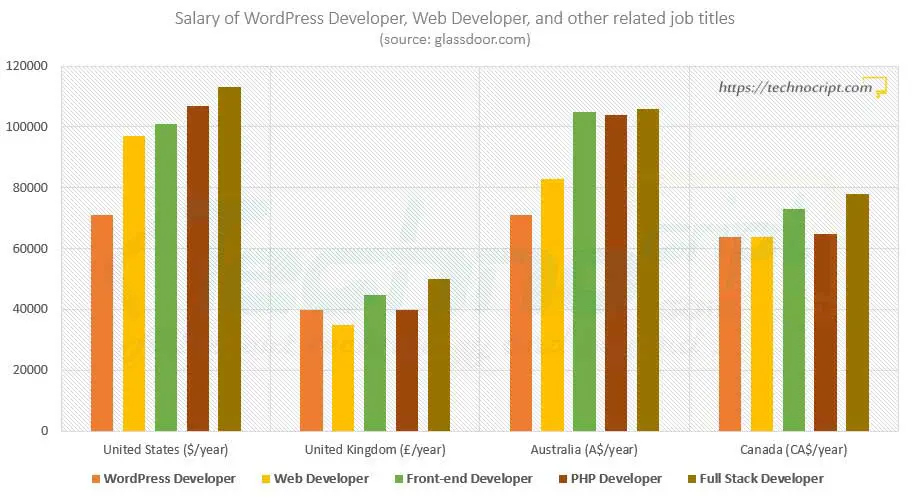
Checking through the previous salary details, it’s noticeable that the salary of WordPress developers is often less than the salary of web developers. It’s also among the smallest in comparison to other closely related job titles in the 4 observed countries.
On the other hand, it’s also obvious that full-stack development is the top-paying job in web development in comparison to other considered job titles.
9. Conclusion
In this article, we delivered a detailed comparison between WordPress developers, web developers, and some other related job titles. We also described their responsibilities and how they differ from a regular WordPress developer’s job.
To summarize:
- WordPress developers are skilled PHP developers who understand WordPress and create plugins and themes.
- WordPress developers are real developers whose work is concentrated on the WordPress platform.
- WordPress developers are not front-end developers but their activities include front-end tasks.
- WordPress developers are also PHP developers, but not every PHP developer is a WordPress developer.
- WordPress developers are not full-stack developers.
- The salary of WordPress developers is often less than the salary of web developers.

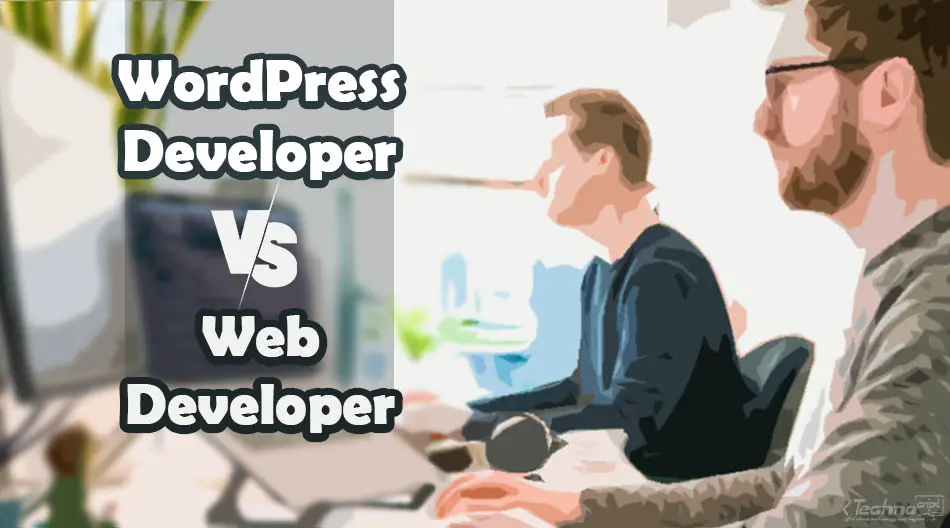
In addition to this being the exact information I need to help me focus my goals for web development, it was very well laid out and covered every question I had. So, thank you!!
Thank you, we are glad you found it helpful!